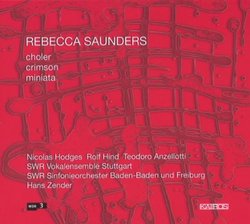| All Artists: Rebecca Saunders, Hans Zender, SWR Baden-Baden and Freiburg Symphony Orchestra, Nicolas Hodges, Rolf Hind Title: Rebecca Saunders: Choler; Crimson; Miniata Members Wishing: 1 Total Copies: 0 Label: Kairos Release Date: 11/1/2008 Genre: Classical Styles: Forms & Genres, Concertos Number of Discs: 1 SwapaCD Credits: 1 |
Search - Rebecca Saunders, Hans Zender, SWR Baden-Baden and Freiburg Symphony Orchestra :: Rebecca Saunders: Choler; Crimson; Miniata
 | Rebecca Saunders, Hans Zender, SWR Baden-Baden and Freiburg Symphony Orchestra Rebecca Saunders: Choler; Crimson; Miniata Genre: Classical
|
Larger Image |
CD DetailsSimilar CDs |
CD ReviewsSaunders' pieces for piano solo or duo are dull, but the orc Christopher Culver | 06/19/2010 (3 out of 5 stars) "Rebecca Saunders (born 1967) is an English composer long resident in Berlin whose music generally follows in the same German modernist tradition as Lachenmann, Rihm and Neuwirth. Instead of traditional harmonies, or even fixed scales, her works are sequences of rich timbres often generated by extended techniques. I enjoyed greatly Saunders' piece "Blue and Grey" on a Neos box set, and the first Kairos disc dedicated to her music, but I have mixed feelings about this release. Pianist Nicolas Hodges is in the spotlight (joined in one piece by Rolf Hind), as is Teodoro Anzelloti, and Hans Zender leads the SWR Sinfonieorchester Baden-Baden und Freiburg and SWR Vokalensemble Stuttgart.
The problem with this disc that it is dominated by two piano works. "Crimson" for solo piano (2005) and "Choler" for two pianos (2004). Saunders just doesn't manage to pull that many sounds out of this fixed-pitch instrument, even with the occasional technique like strumming directly on the strings. What we get is just inchoate tinkling sounds that go on forever (each work hovers around 17 minutes). There are some striking moments here and there, but I'm reluctant to sit through these two works again. However, the grand "Miniata" for accordion, piano, orchestra and choir (2004) is Saunders at her best. This is a work of great variety. Slow, contemplative moments alternate with great violence. The piano's pointillistic writing contrasts with the sustained sounds of the accordion, which often sounds more like live electronics than an accordion. While I think Saunders' music is more reminiscent of Lachenmann, then Rihm, the treatment of voice and ensemble here is quite reminiscent of Rihm's late 1980s works, perhaps a hommage to Saunders' main teacher. "Miniata" is in three-movements, but Kairos has unfortunately put it all within a single CD track. Still, the label ought to be commended for its liner notes, which include three informative essays by Bjorn Gottstein (in German), James Saunders (in English) and Bastien Gallet (in French) as well as score samples from each piece. This kind of music isn't for everyone. A number of reviewers, even those passionate about modernism, complain that this kind of writing lacks any clear line. But for this listener, Saunders' music (at least for more than piano) has a logic to it and rich detail. Those who haven't yet heard this composer ought to start with the first Kairos disc." |

 Track Listings (3) - Disc #1
Track Listings (3) - Disc #1


